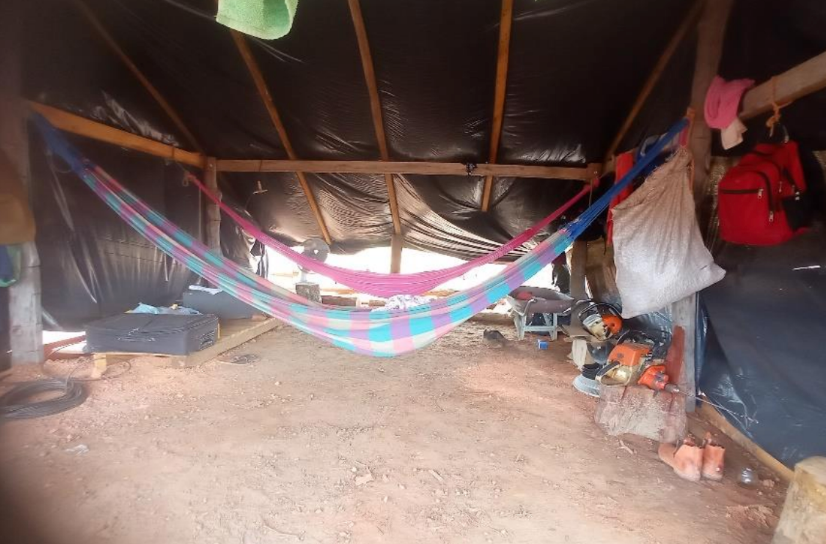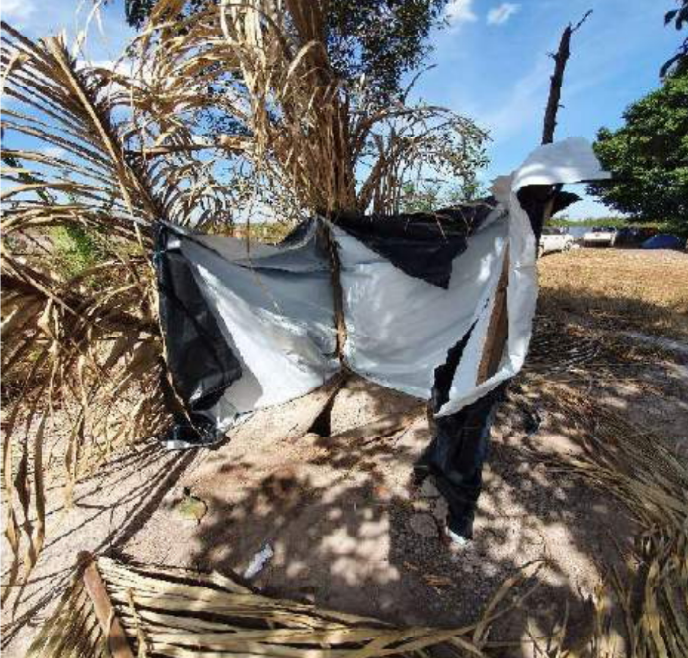August 13, 2025
Nicoly Santos is a Legal Fellow at Corporate Accountability Lab.
Brazil is the world’s largest beef exporter and the third largest exporter of an increasingly profitable byproduct: beef tallow. Behind this multibillion dollar industry are supply chains riddled with forced labor.
On fifteen cattle ranches in Brazil, labor brokers recruited economically vulnerable workers under false pretenses. These workers were promised fair wages, adequate housing, and humane working conditions. In reality, they encountered no running water, sanitation, beds, or even roofs to shelter them. Many workers became indebted to their employers, received little to no pay, and were isolated from their communities, leaving them with little choice but to remain in exploitative conditions. Brazilian labor inspectors deemed these conditions so “degrading” that they were “analogous to slavery.” These workers spent long hours clearing pastures and building fencing for cattle that would be slaughtered, sold as beef, rendered into beef tallow, and exported to the United States.
On July 24, 2025, Corporate Accountability Lab’s (CAL) published a report, Bullsh*t: Forced Labor in Brazil’s Beef and Tallow Supply Chains, which details these abuses and traces the supply chain from fifteen ranches into the United States. That same day, CAL submitted information to U.S. Customs and Border Protection (CBP) under Section 307 of the Tariff Act of 1930 (Section 307), requesting they block all imports of beef tallow – a beef byproduct – produced with forced labor. This was CAL’s third submission to CBP in which we provided evidence of forced labor on cattle ranches in Brazil.
Major corporations, including JBS, Minerva, Marfrig, Diamond Green Diesel (DGD), FASA Group, and Aramco Americas profit from this forced labor. This blog post outlines these findings, providing an overview of the Brazilian beef sector, the rise in popularity of beef tallow, and detailing CAL’s most recent 307 petition urging CBP to block the import of Brazilian tallow linked to forced labor.
The Brazilian Beef Industry
Brazil has approximately 232 million head of cattle and accounts for a quarter of global beef exports. A large proportion of this beef – as well as tallow, leather, and pet food – enters the United States. By May 2025 Brazilian beef exports to the United States had surged by almost 500% relative to the same period in 2024. Yet too many of these imports can be connected back to ranches where forced labor is rampant.
Three major companies dominate the Brazilian beef industry: JBS, Marfrig, and Minerva. Taken together, these three industry giants are responsible for two-thirds of all Brazilian beef exports. These powerful corporations exploit their wealth, dominance, and influence to preserve their status–often at the expense of workers and the environment. Between 2021 and 2023 alone, Mighty Earth identified suppliers of these three companies as responsible for 94,258 hectares of deforestation. JBS, the world’s largest meat processor, faced $6.9 billion USD in legal liabilities at the end of 2024 stemming from tax-related lawsuits, price fixing, labour claims, a recently dismissed case on greenwashing. JBS, Minerva, and Marfrig have been linked to illegal land grabs, cattle laundering, deforestation, and, as CAL recently uncovered, forced labor. There have also been allegations of corruption at JBS and Marfrig, and JBS has even confessed to paying over US$150 million in bribes to more than 1,8000 Brazilian politicians.
In our latest report, Bullsh*t, CAL details how employers subjecting workers to forced labor supplied some of the world’s largest beef and tallow companies. Of the fifteen ranches discussed, five supplied cattle to JBS’s facilities, six to Minerva’s, and three to Marfrig’s. These companies are powerful players in both the Brazilian and U.S. beef markets; JBS is the largest producer of poultry, beef and leather globally, while Minerva is the second largest beef producer in Brazil, and Marfrig is the second largest in the world.
Tallow’s Trendy Rise
Produced by rendering beef fat, tallow has become increasingly popular with a spate of social media influencers touting its virtues. Human Services Secretary Robert F. Kennedy Jr. has called for fast food restaurants to “make frying oil tallow again” after calling seed oils “one of the driving causes of the obesity epidemic.” Consumers looking for healthier cooking oils have sung beef tallow’s praises, calling the fat “heart healthy” and “nutrient-dense” even though there is no evidence to suggest that beef tallow is healthier than seed oils. At the same time, beauty influencers are also encouraging social media followers to use tallow as a natural moisturizer.
Photo taken by an attorney at Corporate Accountability Lab in July, 2025 showing a billboard advertising Steak n Shake’s beef tallow fries.
The Role of the Aviation Industry
Despite this surge in consumer interest, the biggest driver of beef tallow export has been the aviation industry. Animal fats can be used to produce biodiesel, and companies have increasingly invested in using them to produce sustainable aviation fuel.
This increased demand is evident in tallow’s surging exports. Data shows that U.S. interest in converting beef tallow into biodiesel caused imports from Brazil to skyrocket between 2021 and 2024. In 2021, Brazil exported 22,000 metric tons of tallow to the United States. By 2024, imports had surged to over 280,000 metric tons annually.
This vast increase in exports can be linked to Texas-based Darling Ingredients, the world’s second largest renewable diesel producer, and the largest in the United States. In 2022, Darling Ingredients acquired FASA Group which was the single largest independent rendering company in Brazil, operating fourteen rendering plants. In 2012, Darling Ingredients launched a joint venture with Valero Energy, a U.S.-based fuel producer, establishing Diamond Green Diesel (DGD). Between June 2024 and June 2025, DGD was responsible for roughly 75% of tallow imports into the United States, with FASA Group supplying just under half of DGD’s imports.
Aramco Americas, a subsidiary of the world’s largest oil producer, Saudi Arabian state-owned Aramco, has also benefited from Brazilian tallow. While Aramco does not operate biodiesel production plants in the United States, in December 2024 it announced an agreement with France’s TotalEnergies and the Saudi Investment Recycling Company (SIRC) to evaluate the potential construction of a sustainable aviation fuel facility in Saudi Arabia. Since 2023, Aramco Americas imported almost 7,670 metric tons of inedible bovine tallow from Minerva, the second largest beef producer in Brazil.
Through the support of investigative agency Repórter Brasil, CAL confirmed that Diamond Green Diesel’s and Aramco Americas’ supply chains were, like other exports of the Brazilian cattle industry, tainted by forced labor.
Section 307 and the Power of the WRO
Section 307 of the Tariff Act prohibits the importation of goods made, even in part, with forced labor. Under 19 C.F.R. § 12.42(e), if U.S. Customs and Border Protection (CBP) reasonably believes that merchandise is being, or is likely to be, imported into the United States in violation of this provision, CBP may issue a Withhold Release Order (WRO). A WRO prevents the goods from entering the United States and places the burden on the importer to prove that the products were not produced using forced labor at any stage of the supply chain.
CAL’s petition documents that forced labor occurred on three cattle ranches that supply Diamond Green Diesel and Aramco Americas. Across all ranches, employers exploited their workers’ economic vulnerability, leveraging workers’ urgent need for income, to trap them in what Brazilian labor inspectors described as “degrading conditions” – and what constitutes forced labor.
“Degrading” Working and Living Conditions on Cattle Ranches
Photo of where workers on Fazenda São Santo Antônio de Pádua slept, taken from an inspection report produced by the Brazilian Ministry of Labor and Employment on file with Corporate Accountability Lab.
Employers subjected workers to debt bondage and isolation while failing to provide formal contracts and regular wage. Labor brokers deceived and employers abused workers’ financial vulnerability to coerce many workers into living in makeshift shelters or warehouses with no sanitation, sleeping in hammocks or tents, bathing with contaminated water, and cooking over open fires.
Employers routinely failed to provide basic necessities like medical exams, protective equipment, or access to safe food, water, and hygiene. On one ranch, workers recruited others under duress, perpetuating cycles of exploitation.
Photo of where workers on the makeshift “bathroom” workers at Fazenda Alto Guaporé built. This photo was taken from an inspection report produced by the Brazilian Ministry of Labor and Employment on file with Corporate Accountability Lab.
Withholding wages and obscuring payment terms allowed employers to control workers and made them reliant on their employers for survival. The remote locations of these ranches further restricted their ability to seek help.
Tracing investigations detailed in Bullsh*It confirmed that cattle from these operations ultimately contributed to beef tallow exports to DGD and Aramco Americas.
CBP Must Block Forced Labor Imports and Defend U.S. Producers
The International Labour Organization (ILO) defines forced labor as “all work or service which is exacted from any person under the menace of any penalty and for which the said person has not offered himself or herself voluntarily,” according to the Forced Labour Convention, 1930 (No. 29). CBP also uses this definition of forced labor. Based on the conditions described above, CAL identified eight of the eleven forced labor indicators set forth by the ILO, including: (1) abuse of vulnerability, (2) deception, (3) restriction of movement, (4) isolation, (5) withholding of wages, (6) debt bondage, (7) intimidation and threats, and (8) abusive working and living conditions. CBP uses these indicators to determine if forced labor occurred.
As tallow imports continue to rise, it becomes ever more urgent for CBP to act. For years, the Brazilian cattle industry has exploited workers to fuel its growth and profits while the United States has failed to hold the companies that benefit from forced labor accountable.
The Securities and Exchange Commission authorized JBS to list its shares on the NYSE, allowing JBS to profit in the U.S. market despite its sordid history. Marfrig continues operating three slaughtering units and five processing units in the United States, making it the self-described “most profitable and efficient company in the United States beef industry.” Minerva continues to have an ever growing presence in the U.S. market. At the same time, U.S. Cattlemen’s groups “complain that U.S. ranchers are being hurt economically by rising Brazilian beef imports” and echo concerns regarding “forced and child labor” in the Brazilian cattle industry. Cattle ranchers who produce beef using fair labor are forced to unfairly compete against these major corporations profiting from forced labor.
Up and coming tallow companies such as DGD and Aramco Americas should not continue this cycle of exploitation. Nor should U.S. tallow producers suffer from unfair competition posed by tainted imports. It is now up to CBP to demand accountability. Enforcing Section 307 is one crucial step toward combatting forced labor and building a just globalized economy.
To read CAL’s report, click here.
To read CAL’s press release regarding the petition, click here.





